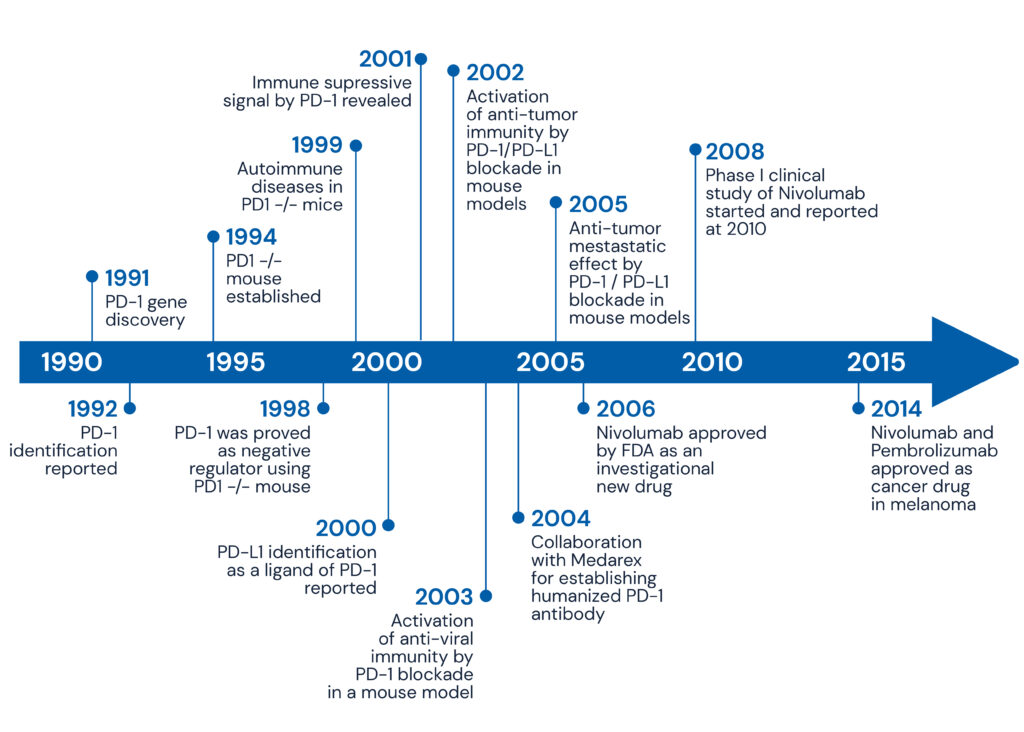PD-1 & the Immune Therapy Revolution: A 30-Year Journey
Cancer immunotherapy has probably been the most profound change in the way we treat cancers since the development of chemotherapy. What makes the impact of immunotherapy so profound is its broad applicability. Almost all other advances in cancer treatment are highly targeted and specific to a given subset of malignancies. Immunotherapy has emerged as the primary treatment option for a wide range of cancer types.
Cancer immunotherapy targets cancer cells by exercising the human body’s innate immunity, without the side effects of chemotherapy, such as attacking cancer cells and damaging other normal cells at the same time.
The market for humanized antibodies that block PD-1 or PD-L1 has been estimated at over 35 billion US$ in 2022, or roughly 22% of the 160 billion US$ market for drugs to fight cancer and is expected to grow significantly over the next decades. In addition, billions of US$ are spent each year on research into combination therapy with other drugs or immune modulators to enhance the efficacy and applicability of these antibodies. Immunotherapy is increasingly assuming a pivotal role in cancer treatment. By 2030, the market value for humanized antibodies targeting PD-1 or PD-L1 is projected to exceed USD 1.4 trillion (approximately 100 trillion JPY), accounting for about 40% of all drugs to fight cancer which highlights the significant growth expected in the coming decades.
Cancer immunosurveillance—the idea that immune cells can detect and eliminate cancer and the principle behind cancer immunotherapy—had been around for decades. But, the output of research into harnessing the immune systems to fight cancer took time and again ended in failure, simply because of the “absence of a full understanding of immune regulatory mechanisms”, as Kenji Chamoto and other write in a new article in Nature Reviews Immunology.
Interestingly, it was the discovery of a negative regulatory system—immune checkpoint inhibitors (a collective term for molecules that brake T cells, such as PD-1 and CTLA-4)—that blocks immune cells to attacking cancer cells that led to a real breakthrough in both our understanding of immune regulation and its application in the form of cancer immunotherapy. Rather than adding additional stimulation, the key to success in cancer therapy was to remove pathways that block immune cells from attacking cancerous cells.
As so often in the history of biology, the initial discovery of PD-1 happened largely by accident and PD-1 was first isolated as an apoptosis-associated gene. It took over a decade before it became clear that the PD-1 pathway is essential in the maintenance of peripheral tolerance to malignant “self” cells, functioning essentially as a “brake” that prevents immune cells from attacking cancerous cells. In 1992, Dr. Ishida and colleagues, who were part of the Honjo laboratory, isolated and identified PD-1 as a gene with enhanced expression during the induction of T-cell death. In 2002 and 2005, Dr. Iwai and Dr. Minato and colleagues working in the Honjo lab demonstrated for the first time that inhibiting the PD-1/PD-L1 pathway can be an effective treatment for cancer, and it was these papers that ultimately contributed to Tasuku Honjo being awarded the 2018 Nobel Prize in Physiology or Medicine. Clinical trials with PD-1 antibody therapy started in the US in 2008, and treatment efficacy was globally announced in 2012. In 2014, PD-1 antibody therapy was first approved in Japan as a treatment for malignant melanoma, leading to subsequent approvals of various PD-1 and PD-L1 inhibitory antibodies for numerous types of cancer.
Figure: History of PD-1 Antibody Cancer Immunotherapy Development

The initial success of checkpoint inhibitors has been followed by a surge in research on possible combination therapies with other cancer drugs or various other approaches to modulate or enhance the immune response. In their review, Chamoto et al. discuss various strategies, but also indicate that both the enormous success and the limitations of immune therapy targeting checkpoint inhibitors point to the more fundamental quest of regulating memory and effector T cell differentiation, which are also crucial in therapeutic strategies against autoimmune diseases and viral infections.
Currently, the standard treatment for various cancer types involves combining checkpoint inhibitors with existing therapies such as anticancer drugs and radiotherapy to enhance their efficacy. Extensive research is being conducted, both domestically and globally to explore and develop combination therapies that maximize the immune system’s potential in combating cancer. These research endeavors encompass a wide range of investigations, including the study of immune modulators, immunometabolic regulators, agents that improve the tumor microenvironment, modulation of intestinal bacteria to regulate the biological environment, and interventions targeting the aging process.
But, while much has been learned about immune regulation over the past two decades, it has also become clear that the biochemical machinery that regulates memory and effector T cell differentiation is complex and subtle and, for the most part, poorly understood. Immune checkpoint inhibitors, and especially drugs targeting the PD-1 pathway, have demonstrated that immune regulation, when it works, is an extremely powerful therapeutic strategy. We are still at the very beginning of our journey to harness the power of the immune system in therapies for cancer, autoimmune disease, and viral infections.
Reference:
Chamoto, K., Yaguchi, T., Tajima, M. et al. Insights from a 30-year journey: function, regulation and therapeutic modulation of PD1. Nat Rev Immunol (2023). DOI: https://doi.org/10.1038/s41577-023-00867-9
